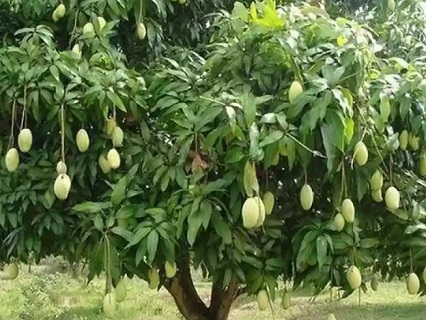Nikhil Prasad Fact checked by:Thailand Medical News Team Sep 17, 2024 7 months, 1 week, 2 days, 6 hours, 40 minutes ago
Herbs And Phytochemicals: Recent research has uncovered exciting new insights into the therapeutic potential of Mangifera indica leaves, commonly known as the mango tree. A group of scientists from several prestigious South Korean institutions, including Gyeongsang National University, Kyungpook National University, and Kangwon National University, investigated the impact of bioactive compounds from mango leaves on oxidative stress and inflammation. Their findings, detailed in this
Herbs And Phytochemicals news report, focus on a cellular pathway regulated by the transcription factor NRF2, which plays a critical role in managing oxidative damage within cells. The study examines how these compounds can protect against diseases caused by oxidative stress, potentially offering new therapies for conditions like cancer and cardiovascular disease.
 Oxylipins from Mango leaves show promise in reducing oxidative stress
Oxylipins from Mango leaves show promise in reducing oxidative stress
The study found that specific compounds in mango leaf extract can activate NRF2, promoting the body’s defense against harmful reactive oxygen species (ROS).
The Role of NRF2 in Cellular Protection
Nuclear factor erythroid 2-related factor 2 (NRF2) is a key protein in the body’s defense mechanism. It regulates the expression of antioxidant and cytoprotective genes, which help cells fight off oxidative damage and inflammation. When activated, NRF2 moves from the cytoplasm into the nucleus, where it binds to antioxidant response elements (AREs) in DNA, triggering the production of protective proteins like heme oxygenase-1 (HO-1) and NAD(P)H quinone oxidoreductase 1 (NQO-1).
In healthy cells, NRF2 is usually suppressed by the protein KEAP1, which tags NRF2 for degradation. However, under conditions of oxidative stress, this degradation is blocked, allowing NRF2 to accumulate and activate the body’s defenses.
Mango Leaves: A Source of Powerful Antioxidants
Mango leaves have long been used in traditional medicine due to their rich composition of bioactive compounds. The researchers specifically explored the effects of oxylipins, a group of naturally occurring fatty acid derivatives isolated from the n-hexane fraction of mango leaves (MLHx). Oxylipins are known for their role in modulating inflammation and oxidative stress, making them an intriguing candidate for NRF2 activation.
The study used advanced techniques such as liquid chromatography and mass spectrometry to isolate and characterize six distinct oxylipins from mango leaf extract. These compounds were tested in HeLa cells, a type of human cervical cancer cell line, to evaluate their potential in boosting NRF2 activity.
Key Findings from the Study
The research team discovered that MLHx significantly increased the activity of NRF2 by promoting its movement into the cell nucleus, where it activates antioxidant genes. The effects were particularly pronounced at a concentration of 100 µg/mL, a dose that did not cause toxicity to the cells. Inte
restingly, MLHx also triggered the expression of the HO-1 gene, a well-known target of NRF2, which plays a crucial role in cellular protection against oxidative stress.
The six oxylipins isolated from mango leaves were further tested for their ability to activate the NRF2 pathway. Among the compounds, three - identified as C-3, C-5, and C-6 - showed the strongest stimulation of NRF2 activity in a dose-dependent manner. These findings suggest that mango leaf extract, particularly the oxylipins it contains, could be a potent activator of NRF2 and a valuable tool in preventing or treating diseases associated with oxidative stress.
How MLHx Activates NRF2: The Role of Signaling Pathways
The researchers also investigated the molecular mechanisms behind MLHx's ability to activate NRF2. They found that MLHx increases the phosphorylation of ERK1/2, a key protein in the mitogen-activated protein kinase (MAPK) pathway. This phosphorylation stabilizes NRF2, preventing its degradation and allowing it to accumulate in the nucleus. Interestingly, while ERK1/2 was significantly activated, another pathway involving the protein AKT was not affected by MLHx, indicating that the NRF2 activation was specific to the MAPK pathway.
Implications for Health and Disease
Oxidative stress is a major contributing factor to many chronic diseases, including cancer, cardiovascular diseases, and neurodegenerative disorders like Alzheimer’s and Parkinson’s disease. The ability to activate NRF2 and boost the body’s natural defenses against oxidative damage offers exciting potential for developing new therapies.
This study highlights the potential of natural compounds, particularly those found in mango leaves, to serve as NRF2 activators. The fact that compounds like C-3, C-5, and C-6 were able to significantly enhance NRF2 activity in cells suggests that they could be useful in therapeutic strategies aimed at reducing oxidative stress.
Potential for Therapeutic Applications
The hexane fraction of mango leaves, along with its isolated oxylipins, holds great promise for therapeutic applications. By enhancing NRF2 activity, these compounds can help cells better cope with oxidative stress, potentially preventing the onset of diseases or slowing their progression. Further research is needed to determine the best way to harness these compounds in a clinical setting, but the results of this study are an important step forward in understanding the therapeutic potential of natural antioxidants.
Conclusion
In summary, this research underscores the potential of Mangifera indica leaves as a source of powerful antioxidants. The study successfully isolated six oxylipins from mango leaves, three of which - C-3, C-5, and C-6 - demonstrated significant activation of NRF2. By promoting the body’s natural defenses against oxidative stress, these compounds could be valuable in developing treatments for a variety of diseases, particularly those linked to oxidative damage.
The study findings were published in the peer-reviewed journal: Antioxidants
https://www.mdpi.com/2076-3921/13/9/1119
For the latest on
Herbs and Phytochemicals, keep on logging to Thailand Medical News.
Read Also:
https://www.thailandmedical.news/news/herbs-and-phytochemicals-oroxylum-indicum-extracts-boosts-brain-health-and-are-neuroprotective
https://www.thailandmedical.news/news/herbs-and-phytochemicals-aqueous-root-extract-of-withania-somnifera-ameliorates-lung-inflammation-caused-by-covid-19
https://www.thailandmedical.news/articles/herbs-and-phytochemicals
